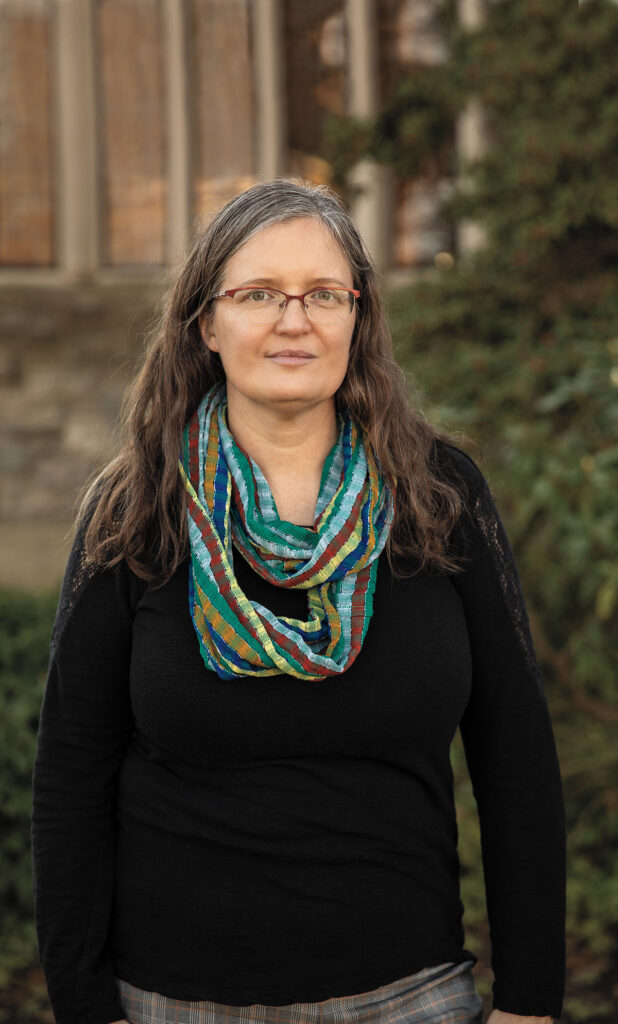Immigrant-rights Lawyer Advocates on Behalf of Children
Kimberly Krone, BS’99 (Flor)
By Mary Ann Bautista

Kimberly Krone (Photo: Bill Cardoni)
Kimberly Krone, BS’99 (Flor), recognizes it in her clients’ eyes — desperation, pain, hopelessness — because she felt all three as a child and adolescent. “I grew up in a single-parent household with a mother who worked long hours, earned low wages and had a substance-abuse problem,” she says. “My mother was largely absent during my adolescence.”
Often caught in predicaments as a juvenile, Krone was labeled a troublemaker by her mother and school administrators. “I was misunderstood,” she adds. “Getting in trouble was my way of telling them that something was wrong at home.”
Determined to shed that misperception, Krone focused on college. At a friend’s suggestion, she applied to FDU and received a full scholarship. “College was a great opportunity and an important turning point in my life,” she says.
Now a senior attorney at KIND (Kids in Need of Defense) in Newark, N.J., Krone oversees its pro bono attorney recruitment and mentoring program, to provide immigrant children with high-quality, effective and compassionate legal representation. “I feel strongly about advocating for kids because I want to make sure that they are not criminalized by society and labeled delinquent.”
Krone didn’t anticipate a career in immigration law. After studying chemistry at FDU, she worked as a research scientist in the pharmaceutical industry. But her heart wasn’t in it.
While doing immigrant-rights advocacy work as a volunteer, she realized she wanted to study law. She graduated from law school in 2012, and worked with the American Friends Service Committee (AFSC) as a KIND fellow. “I was drawn to KIND because it focuses on children and youth,” she says.
Her clients are often trauma survivors who have suffered abandonment, abuse, trafficking or sexual violence and are seeking asylum or Special Immigrant Juvenile Status.
One, a 13-year-old boy, came to the U.S. to join his mother, who had fled Honduras to escape domestic and gang violence.
“She left him in Honduras with relatives, not knowing her ex-partner was going to take his anger out on him,” Krone says. “The boy was beaten up, tied to a desk at an abandoned school for days — with barely any food and water — and he was sexually abused.” His trauma gave rise to behavioral issues that school administrators were not prepared to handle.
“Thankfully, he was granted asylum, and his mother fought hard to make sure he received the help he desperately needed,” she adds.
For every triumph, however, there are countless losses. But Krone presses forward, giving clients much-needed hope and support. She remembers a teenager whose case was denied. “Although incredibly disappointed at the loss, he made it clear that my presence and support throughout his detention meant the world to him.”
The victories may not come as often as she wants, but for Krone the struggle is worth the effort. “It gives me joy to see children who have been through hell, have the opportunity to enjoy being a child, to move toward healing and toward reaching their full potential,” she says. “It’s just knowing that I played a role in transforming their lives for the better.”
FINDING HER PEOPLE
“As a first-generation college student, FDU’s small class sizes enabled me to forge a community of friends and professors. They provided support, helping me navigate a new chapter of my life.”
BREAKING THE CYCLE
“I’m resilient and a cycle breaker (in my family). There will always be challenges, but I‘ll never give up.”
LENDING A HAND
“I support Visions and Pathways, which provides housing and social services for at-risk youth in New Jersey; PeaceWorks, which supports community organizations in Nicaragua; and SHARE El Salvador, an international solidarity organization in El Salvador and Honduras. My husband (FDU alumnus Adolfo Bejarano Hernandez, BA’06 [Metro]) and I have been on PeaceWorks’ delegations to Nicaragua and regularly attend dinner forums and other activities.”